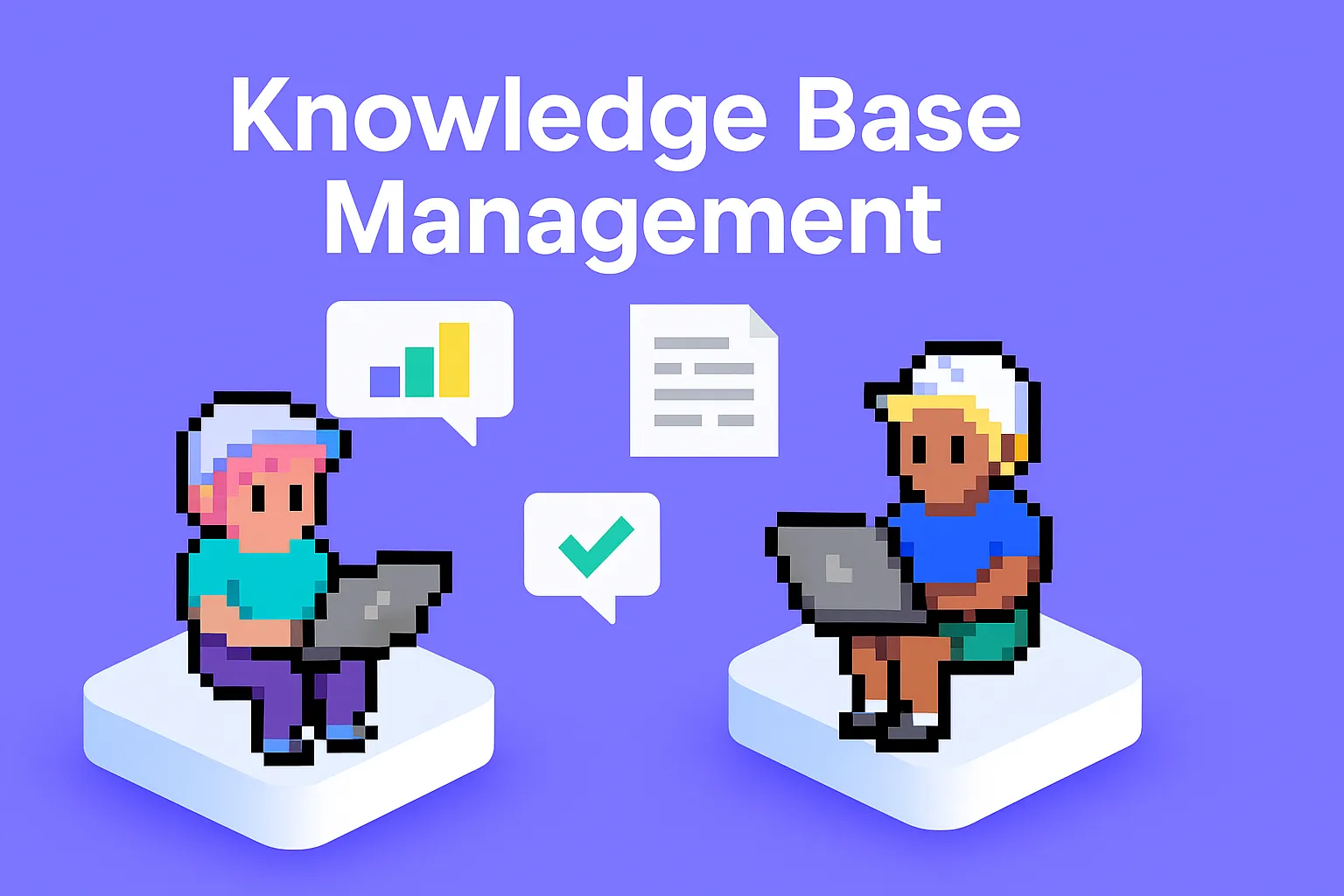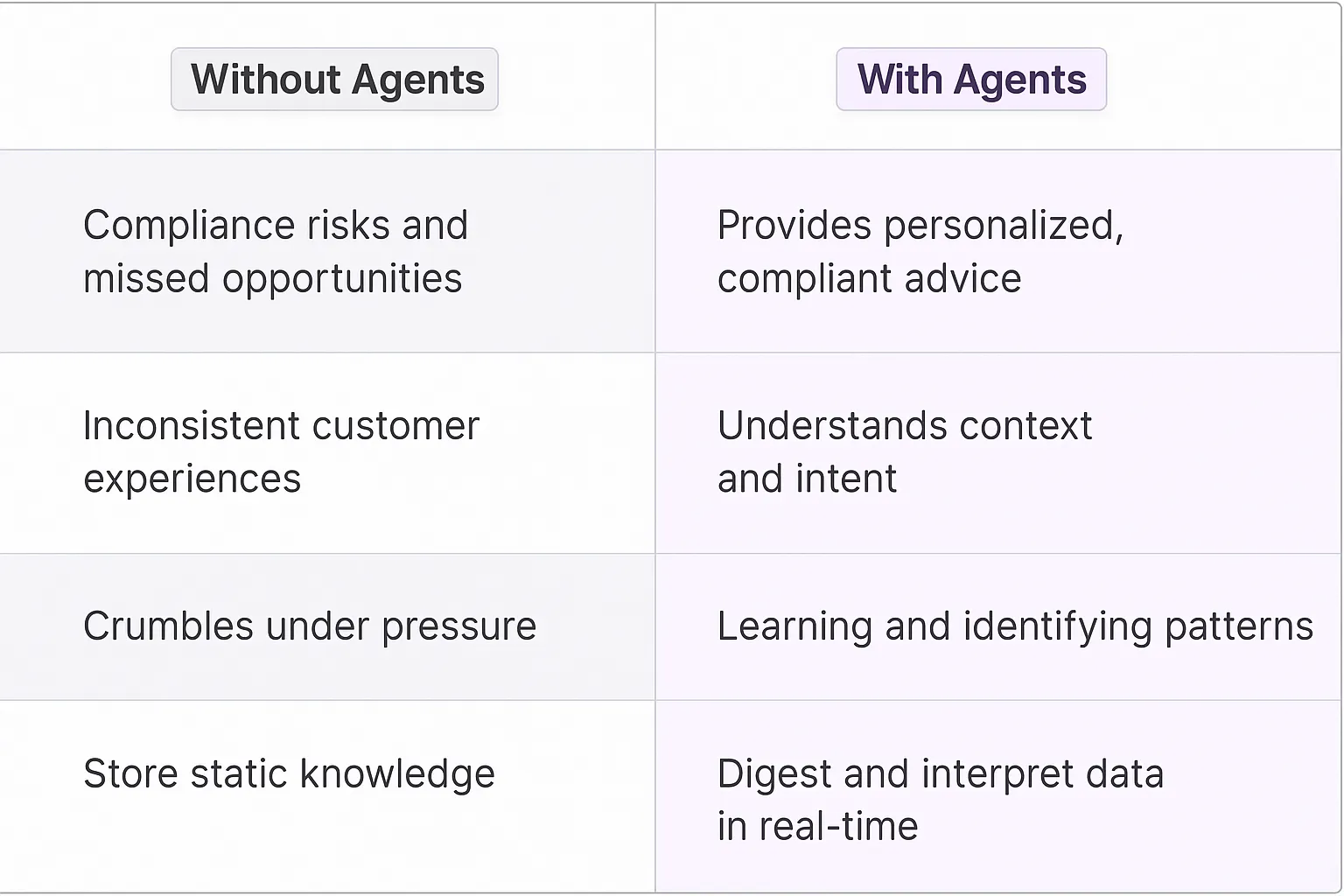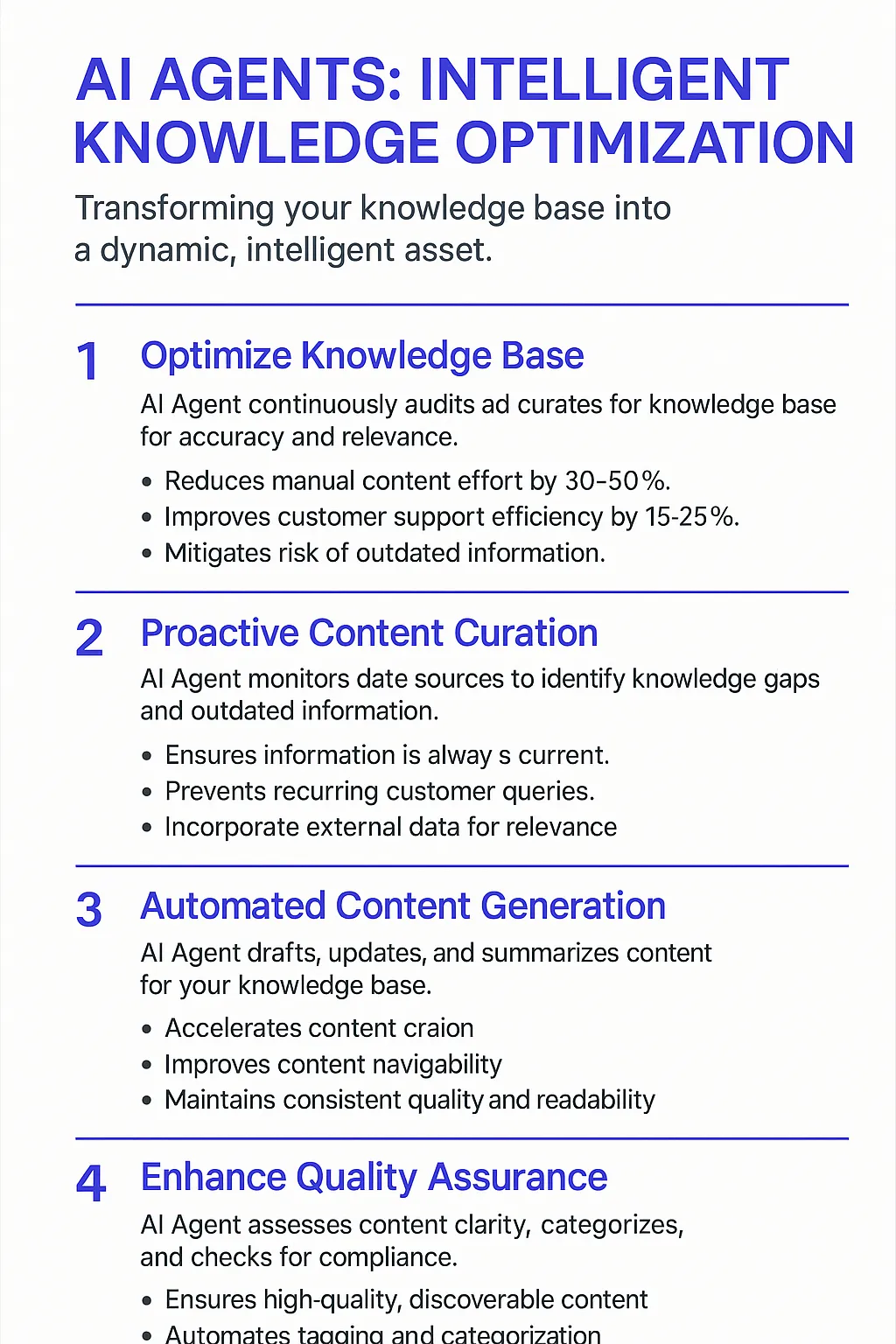Knowledge Base Management AI Agents
The Evolution of Knowledge Management with AI Agents
Knowledge Base Management is the process of creating, organizing, and maintaining a centralized repository of information within an organization. It's the backbone of institutional knowledge, enabling teams to capture, share, and leverage collective wisdom. In the past, this was a manual, often tedious process. But with the advent of AI, we're seeing a seismic shift in how knowledge bases are managed and utilized.
Modern Knowledge Base Management systems, powered by AI agents, offer a suite of game-changing features:1. Intelligent content curation: AI continuously analyzes and organizes information, keeping the knowledge base fresh and relevant.2. Contextual understanding: These systems grasp the intent behind queries, delivering precise, relevant answers.3. Personalization: AI tailors the knowledge base experience to individual users based on their role, behavior, and preferences.4. Proactive gap identification: AI agents flag outdated information and suggest updates, ensuring comprehensive coverage.5. Scalability: As organizations grow, AI effortlessly manages increasing complexity and data volume.6. Advanced analytics: AI provides actionable insights on usage patterns and trending topics, driving continuous improvement.

Benefits of AI Agents for Knowledge Base Management
What would have been used before AI Agents?
Before AI agents entered the scene, knowledge base management was a manual slog. Teams relied on dedicated knowledge managers or subject matter experts to curate, organize, and maintain information. This approach was slow, error-prone, and often resulted in outdated or inconsistent content. Users struggled with clunky search interfaces and spent precious time sifting through irrelevant results. It was like trying to find a specific book in a massive library without a catalog system – frustrating and inefficient.
What are the benefits of AI Agents?
AI agents are transforming knowledge base management into a dynamic, intelligent process. These digital teammates act as tireless curators, constantly analyzing and organizing information. They're like having a team of expert librarians working 24/7 to keep your knowledge base in top shape.
One of the most significant benefits is the AI's ability to understand context and intent. When a user searches for information, the AI doesn't just match keywords – it grasps the underlying question and delivers precise, relevant answers. This level of understanding dramatically reduces time-to-information and improves user satisfaction.
AI agents also excel at identifying knowledge gaps and inconsistencies. They can flag outdated information, suggest updates, and even generate new content to fill gaps. This proactive approach ensures that your knowledge base remains current and comprehensive without constant human oversight.
Another game-changing benefit is personalization. AI agents can tailor the knowledge base experience to individual users based on their role, preferences, and behavior. Imagine a knowledge base that adapts to each user, presenting the most relevant information front and center – that's the power of AI-driven personalization.
Scalability is where AI agents really shine. As your organization grows and your knowledge base expands, AI agents can handle the increased complexity without breaking a sweat. They can manage and make sense of vast amounts of data, something that would be overwhelming for human teams.
Lastly, AI agents bring a level of analytics and insights that was previously unattainable. They can track usage patterns, identify trending topics, and provide actionable insights to continuously improve the knowledge base. This data-driven approach allows organizations to evolve their knowledge management strategy based on real user needs and behaviors.
In essence, AI agents are turning knowledge bases from static repositories into living, breathing ecosystems of information. They're not just making knowledge management more efficient – they're fundamentally changing how organizations capture, share, and leverage their collective intelligence.

Potential Use Cases of AI Agents with Knowledge Base Management
Processes
Knowledge base management is ripe for AI-driven innovation. These digital teammates can transform how we organize, update, and leverage information within organizations. Let's dive into some game-changing use cases:
- Continuous content curation: AI agents can sift through vast amounts of internal and external data, identifying relevant information to add to the knowledge base. They'll spot trends, flag outdated content, and suggest updates, keeping your knowledge repository fresh and valuable.
- Intelligent categorization: Say goodbye to manual tagging. AI can analyze content and automatically categorize it using natural language processing, ensuring consistent organization across your knowledge base.
- Version control and change management: AI agents can track document revisions, highlight significant changes, and maintain a clear audit trail. This process ensures everyone's working with the most up-to-date information.
- Personalized knowledge delivery: By understanding user roles, preferences, and behavior, AI can serve up tailored content recommendations, making it easier for team members to find exactly what they need.
Tasks
On a more granular level, AI agents can tackle specific knowledge management tasks with impressive efficiency:
- Automated summarization: AI can generate concise summaries of lengthy documents or multiple related pieces of content, saving time for busy professionals.
- Cross-referencing and link suggestion: As new content is added, AI can identify related information within the knowledge base and suggest internal links, improving navigation and knowledge discovery.
- Content gap analysis: By analyzing user queries and content engagement, AI can identify areas where the knowledge base is lacking and suggest topics for new content creation.
- Multilingual support: AI-powered translation can help maintain consistency across knowledge bases in different languages, ensuring global teams have access to the same high-quality information.
- Quality assurance: AI agents can review content for accuracy, clarity, and adherence to style guidelines, flagging issues for human review and maintaining overall quality standards.
The integration of AI into knowledge base management isn't just an incremental improvement – it's a paradigm shift. These digital teammates are set to become indispensable partners in curating, organizing, and leveraging organizational knowledge. As they continue to evolve, we'll see even more sophisticated applications that push the boundaries of what's possible in knowledge management.

Industry Use Cases for Knowledge Base Management AI Agents
AI agents are reshaping how we approach knowledge base management across sectors. These digital teammates aren't just fancy search engines; they're becoming indispensable partners in curating, organizing, and leveraging organizational wisdom. Let's dive into some concrete examples of how different industries are putting these AI agents to work, transforming their knowledge bases from static repositories into dynamic, actionable resources.
From tech startups to healthcare giants, companies are tapping into the power of AI to unlock the full potential of their collective knowledge. These use cases demonstrate how AI agents are not just enhancing efficiency, but fundamentally changing how teams interact with and benefit from their knowledge bases. It's a shift that's as much about culture and collaboration as it is about technology.
Transforming E-commerce with Knowledge Base Management AI Agents
Let's talk about how Knowledge Base Management AI Agents are reshaping the e-commerce landscape. These digital teammates are not just fancy chatbots; they're the secret sauce behind creating a seamless, personalized shopping experience that keeps customers coming back for more.
Take a major online retailer like Amazon or Shopify. They're dealing with millions of products, constantly changing inventory, and a flood of customer inquiries. Traditional knowledge management systems struggle to keep up, often leaving customers frustrated and sales opportunities on the table.
Enter Knowledge Base Management AI Agents. These smart systems can ingest, organize, and retrieve vast amounts of product information, customer data, and support documentation in real-time. They're like having a team of superhuman product experts working 24/7.
Here's where it gets interesting: these AI agents don't just store information; they understand context and intent. When a customer asks about the best running shoes for flat feet, the AI doesn't just spit out a list of products. It considers the customer's purchase history, browsing behavior, and even current trends to provide tailored recommendations.
But it doesn't stop there. These AI agents are constantly learning and updating the knowledge base. They analyze customer interactions, identify gaps in product information, and even predict future customer needs. This dynamic approach to knowledge management means the e-commerce platform is always one step ahead, offering a level of personalization and service that was previously impossible at scale.
The result? Higher conversion rates, increased customer satisfaction, and a significant reduction in support costs. It's not just about answering questions faster; it's about creating a shopping experience that feels intuitive, personal, and effortless.
In the cutthroat world of e-commerce, where the difference between success and failure can be measured in milliseconds and mouse clicks, Knowledge Base Management AI Agents are becoming the ultimate competitive edge. They're not just changing how we shop online; they're redefining what it means to provide exceptional customer service in the digital age.
Reinventing Financial Services with Knowledge Base Management AI Agents
The financial services industry is ripe for disruption, and Knowledge Base Management AI Agents are leading the charge. These digital teammates are transforming how banks, investment firms, and insurance companies operate, creating a new paradigm of customer service and operational efficiency.
Consider a global bank like JPMorgan Chase or HSBC. They're juggling complex regulations, diverse product offerings, and millions of customer interactions daily. Traditional knowledge management systems often crumble under this pressure, leading to compliance risks, inconsistent customer experiences, and missed opportunities.
Knowledge Base Management AI Agents are changing the game. They're not just storing information; they're creating a living, breathing ecosystem of financial knowledge. These AI agents can digest and interpret vast amounts of data from regulatory documents, market reports, product specifications, and customer interactions in real-time.
What's truly fascinating is how these AI agents apply this knowledge. When a customer inquires about the best retirement planning options, the AI doesn't just recite product features. It considers the customer's financial history, risk tolerance, market conditions, and even recent regulatory changes to provide personalized, compliant advice. It's like having Warren Buffett and a team of compliance officers at your fingertips.
But the real magic happens behind the scenes. These AI agents are constantly learning, identifying patterns in customer behavior, spotting emerging market trends, and even predicting potential regulatory issues before they arise. This proactive approach to knowledge management allows financial institutions to stay ahead of the curve, offering innovative products and services that meet evolving customer needs while navigating complex regulatory landscapes.
The impact is profound. We're seeing faster onboarding times, reduced compliance risks, and a level of personalized service that was previously reserved for high-net-worth clients. It's democratizing financial advice and making sophisticated financial services accessible to a broader audience.
In an industry where trust is currency and knowledge is power, Knowledge Base Management AI Agents are becoming the secret weapon for forward-thinking financial institutions. They're not just improving customer service; they're redefining what it means to be a trusted financial partner in the digital age.
Considerations
Technical Challenges
Implementing a Knowledge Base Management AI Agent isn't a walk in the park. It's more like trying to teach a robot to be a librarian, archivist, and data scientist all at once. The first hurdle? Data integration. Your AI needs to play nice with a smorgasbord of data sources - from legacy systems that predate the internet to cutting-edge cloud platforms. It's like trying to get a group of people who speak different languages to have a coherent conversation.
Then there's the issue of data quality. Garbage in, garbage out, as they say. Your AI is only as good as the data it's fed. Ensuring data accuracy, completeness, and relevance is a Herculean task. It's not just about having a lot of data; it's about having the right data. Think of it as curating a gourmet meal rather than throwing everything in your fridge into a blender.
Natural Language Processing (NLP) is another beast to tackle. Your AI needs to understand human queries, which are often as clear as mud. It's not just about keyword matching; it's about grasping context, intent, and even the subtle nuances of human communication. It's like teaching a computer to understand sarcasm - good luck with that.
Operational Challenges
On the operational front, user adoption is the elephant in the room. You can have the most sophisticated AI in the world, but if your team treats it like that fancy kitchen gadget they never use, you're dead in the water. Getting people to change their habits is like trying to convince a cat to take a bath - possible, but not without some scratches.
Then there's the ongoing maintenance and updates. Knowledge doesn't stand still, and neither should your AI. You need a system that can learn and evolve, adapting to new information and changing business needs. It's like trying to hit a moving target while riding a unicycle - challenging, to say the least.
Privacy and security concerns are another can of worms. Your knowledge base is likely to contain sensitive information. Ensuring that your AI can discern who should have access to what information is crucial. It's a balancing act between making information accessible and keeping it secure - like trying to build a house with open doors but impenetrable walls.
Lastly, there's the challenge of measuring ROI. How do you quantify the value of improved knowledge management? It's not as straightforward as counting widgets produced. You're dealing with intangibles like improved decision-making and increased productivity. It's like trying to measure the weight of an idea - not impossible, but definitely not straightforward.
The Future of Organizational Intelligence: AI-Driven Knowledge Management
Knowledge Base Management AI Agents are more than just a technological upgrade; they're catalyzing a fundamental shift in how organizations harness their collective intelligence. By transforming static repositories into dynamic, context-aware systems, these AI agents are unlocking new levels of efficiency, personalization, and insight.
The impact spans industries, from revolutionizing e-commerce customer experiences to reinventing financial services. However, implementation comes with its own set of challenges, from technical hurdles like data integration to operational concerns around user adoption and ROI measurement.
Despite these challenges, the trajectory is clear. As AI continues to evolve, we're moving towards a future where knowledge bases become living, breathing ecosystems of information. They'll not only respond to queries but anticipate needs, identify trends, and drive innovation.
For organizations willing to embrace this shift, the rewards are substantial. Those who successfully integrate AI agents into their knowledge management strategies will find themselves with a powerful competitive edge, better equipped to navigate the complexities of our data-driven world.
The knowledge base of the future isn't just a tool; it's a strategic asset that grows smarter with every interaction. As we stand on the brink of this transformation, one thing is certain: the organizations that master AI-driven knowledge management will be the ones shaping the future of their industries.













